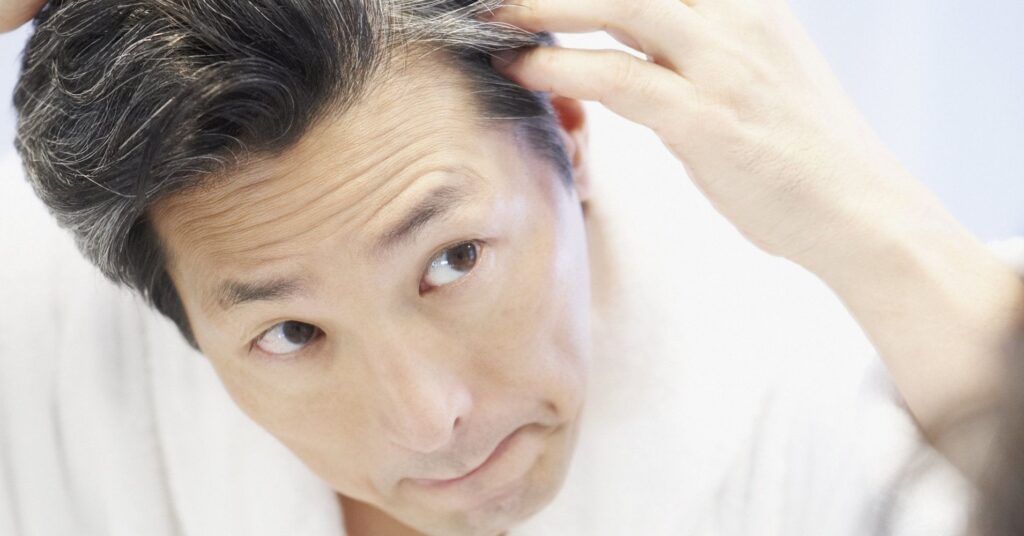Introduction
Are you starting to notice a few gray hairs sneaking in among your luscious locks? Don’t panic! Going gray is a natural part of aging that most of us will experience at some point in our lives. While some people choose to embrace their silver strands, others may prefer to cover them up. Whatever your preference, there are plenty of options available to help you navigate the transition from colored hair to gray. In this article, we will explore some of the best strategies for dealing with graying hair, from embracing your natural beauty to experimenting with different hair colors.
Embracing Your Gray Hair
The first step in dealing with graying hair is accepting it as a beautiful and natural part of the aging process. Instead of trying to hide or cover up your gray strands, consider embracing them as a unique and stylish feature of your hair. Many people find that going gray can actually enhance their overall look and give them a sense of confidence and sophistication. If you’re feeling hesitant about fully embracing your gray hair, consider gradually transitioning to natural gray by letting your roots grow out and blending them with your existing colored hair.

Trying Out Different Hair Colors
If you’re not quite ready to fully embrace your gray hair, there are plenty of hair coloring options available to help you maintain your preferred hair color. From temporary root touch-ups to semi-permanent dyes, there are a variety of products designed specifically for covering up gray hairs. If you’re feeling adventurous, you could also experiment with different hair colors to find a look that suits your personality and style. Just be sure to choose high-quality hair dye products to avoid damaging your hair.
Consulting with a Professional Hairstylist
If you’re unsure about how to deal with your graying hair, consider scheduling a consultation with a professional hairstylist. A hairstylist can provide expert advice on the best hair coloring options for covering up gray hairs or transitioning to natural gray. They can also recommend hair care products and styling techniques to help you maintain healthy and beautiful hair. Remember, a professional hairstylist has the knowledge and experience to help you achieve the look you desire while keeping your hair in top condition.
Embracing Natural Hair Care Products
The shift towards natural hair care products has gained significant popularity in recent years, and for good reasons. Natural hair care products, made from plant-based ingredients, are free from harsh chemicals and focus on nourishing, protecting, and maintaining the hair’s health. Embracing these products can lead to healthier, shinier hair while promoting long-term hair and scalp wellness. Here’s a detailed guide on how and why you should embrace natural hair care products:

1. Why Choose Natural Hair Care Products?
- No Harsh Chemicals: Natural products are typically free from sulfates, parabens, silicones, and synthetic fragrances. These chemicals can strip your hair of natural oils, cause dryness, irritation, and may even lead to long-term damage.
- Environmentally Friendly: Many natural hair care products are sustainably sourced, cruelty-free, and biodegradable. Using these products supports ethical practices and reduces environmental impact.
- Gentler on the Hair and Scalp: Natural ingredients like aloe vera, coconut oil, and shea butter nourish and moisturize the scalp without irritation. This is particularly beneficial for people with sensitive skin or conditions like dandruff, eczema, or psoriasis.
- Supports Hair Growth and Repair: Ingredients such as rosemary oil, castor oil, and biotin are known to promote hair growth and repair damaged hair. By using natural products, you allow these ingredients to work without interference from synthetic chemicals.
2. Key Natural Ingredients to Look For
- Aloe Vera: Known for its moisturizing and soothing properties, aloe vera helps reduce scalp irritation, hydrates the hair, and strengthens the hair shaft.
- Coconut Oil: This versatile oil penetrates deep into the hair shaft to reduce protein loss and prevent breakage. It also adds shine and softness.
- Shea Butter: A rich emollient, shea butter provides intense moisture and protection, especially for curly, coily, and textured hair.
- Argan Oil: Often referred to as “liquid gold,” argan oil is packed with antioxidants and vitamins that nourish and protect hair from damage.
- Tea Tree Oil: With its antibacterial and anti-inflammatory properties, tea tree oil is excellent for maintaining a healthy scalp and preventing dandruff.
- Rosemary Oil: Known to stimulate hair follicles, rosemary oil can help with hair growth and reduce thinning.
3. Avoiding Harmful Ingredients
- Sulfates: Found in many shampoos, sulfates are harsh detergents that can strip hair of natural oils, leading to dryness and frizz. Sulfate-free shampoos made with natural cleansers are gentler on the hair.
- Parabens: These synthetic preservatives can disrupt hormone function and have been linked to various health concerns. Natural products use safer alternatives like vitamin E or essential oils for preservation.
- Silicones: Often found in conditioners and serums, silicones coat the hair to provide instant smoothness. However, over time they can build up, leading to dull, weighed-down hair. Natural oils like jojoba or argan oil provide similar smoothness without the buildup.
4. Types of Natural Hair Care Products
- Shampoos and Conditioners: Natural shampoos and conditioners often use plant-based cleansers and moisturizers. These products gently cleanse without stripping oils and offer lasting moisture and shine.
- Hair Masks: Natural hair masks, made with ingredients like honey, avocado, and coconut oil, provide deep conditioning and repair damaged hair. Use these once a week for extra nourishment.
- Leave-in Conditioners and Detanglers: Look for products with ingredients like aloe vera, shea butter, or glycerin to hydrate and smooth your hair without weighing it down.
- Styling Products: For natural styling gels and creams, opt for products with flaxseed oil, marshmallow root, and other botanical ingredients that enhance texture without flaking or stiffness.
- Serums and Oils: Use natural oils like argan, jojoba, or rosehip oil for finishing touches, adding shine, and locking in moisture. These oils are rich in vitamins and fatty acids that nourish the hair.
5. Transitioning to Natural Hair Care Products
Switching to natural hair care products requires some patience and adjustments. Here’s how to make the transition smoother:
- Detox Your Hair: If you’ve been using synthetic products for a long time, you may experience a transition period where your hair feels dry or oily as it adjusts to being free from chemicals. Consider using a clarifying shampoo made with natural ingredients to remove product buildup.
- Be Consistent: Natural products may take longer to show results compared to synthetic products, but they offer long-lasting benefits. Stick with them for a few weeks to allow your hair to adjust and see the full effect.
- Experiment: Not all natural products work for every hair type. Experiment with different brands and ingredients to find what works best for your unique hair needs.

6. Catering to Different Hair Types
- Curly and Coily Hair: Natural oils like coconut, castor, and olive oil work wonders for adding moisture and reducing frizz. Shea butter and aloe vera-based products help define curls and prevent breakage.
- Straight Hair: Lightweight oils like argan or jojoba provide shine without weighing down straight hair. Aloe vera-based shampoos and conditioners offer hydration and softness.
- Fine Hair: Choose lighter formulas with ingredients like green tea extract, chamomile, or rose water that won’t overwhelm or weigh down fine hair.
- Color-Treated Hair: Look for color-safe natural products that contain ingredients like sunflower seed oil and pomegranate extract to help maintain your color while moisturizing and protecting the hair.
7. Long-Term Benefits of Natural Hair Care
- Stronger, Healthier Hair: Over time, your hair becomes stronger and healthier as it receives the nutrients it needs without the interference of harsh chemicals.
- Less Damage: Since natural products are free from drying sulfates and damaging silicones, they help reduce split ends, breakage, and overall hair damage.
- Sustainable and Ethical: Natural products are often more sustainable, meaning they are better for both your hair and the planet. Many brands focus on ethical sourcing, reducing carbon footprints, and avoiding animal testing.
Conclusion
Dealing with graying hair can be a challenging experience, but it doesn’t have to be a stressful one. Whether you choose to embrace your gray strands or cover them up, there are plenty of options available to help you navigate the transition. By following these tips and consulting with a professional hairstylist, you can achieve a beautiful and stylish look that makes you feel confident and empowered. Remember, going gray is a natural part of life, so embrace it with grace and style!